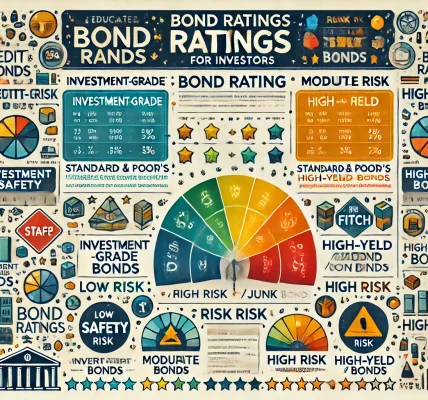Investing in international bonds can be an attractive option for investors looking to diversify their portfolios and access global markets. With opportunities for higher yields, currency diversification, and exposure to growing economies, international bonds can play a crucial role in a well-balanced investment strategy. However, these bonds also come with unique risks that investors must understand before diving in.
In this comprehensive guide, we will explore the opportunities and risks associated with international bonds and provide insights to help you make informed investment decisions.
What Are International Bonds?
International bonds are debt securities issued by foreign governments, corporations, or financial institutions. These bonds are typically denominated in a currency other than the investor’s home currency and are sold in international bond markets.
Types of International Bonds:
- Sovereign Bonds: Issued by foreign governments (e.g., U.S. Treasury bonds, Japanese Government Bonds).
- Corporate Bonds: Issued by foreign companies to raise capital.
- Eurobonds: Bonds issued in a currency other than the home country’s currency.
- Foreign Currency Bonds: Issued in the currency of the issuing country and sold to international investors.
Opportunities in International Bond Investing
1. Diversification Benefits
International bonds provide geographic diversification, reducing the risk associated with relying solely on domestic markets. This diversification can stabilize a portfolio during times of economic uncertainty.
2. Higher Yields
Certain emerging markets and foreign corporations offer higher yields than domestic bonds due to increased risk and differing interest rate environments. Investors seeking better returns may find international bonds appealing.
3. Currency Diversification
By investing in bonds denominated in foreign currencies, investors can hedge against domestic currency devaluation and benefit from favorable exchange rate movements.
4. Access to Emerging Markets
International bonds provide exposure to high-growth economies and developing countries. These bonds can enhance returns and offer new investment avenues that may not be available domestically.
5. Portfolio Stability
Different regions and economies react differently to global economic changes. International bonds can help balance portfolio volatility and mitigate risks from a single market downturn.
Risks in International Bond Investing
1. Currency Risk
Fluctuations in exchange rates can significantly impact the value of international bonds. A strengthening home currency can reduce the returns of foreign-denominated bonds.
Example: If you invest in a Euro-denominated bond and the Euro weakens against your home currency, the value of your investment decreases when converted back.
2. Political and Economic Risk
International bonds are exposed to the political and economic conditions of the issuing country. Changes in government policies, economic instability, or geopolitical events can affect bond performance.
Example: Political turmoil in emerging markets can lead to bond defaults or delayed interest payments.
3. Interest Rate Risk
Like domestic bonds, international bonds are sensitive to changes in interest rates. Rising rates can lead to declining bond prices and reduced market value.
Example: If the European Central Bank raises interest rates, the value of existing Euro-denominated bonds may fall.
4. Liquidity Risk
Some international bonds, especially those from smaller or emerging markets, may have lower liquidity. This can make it challenging to buy or sell bonds quickly at fair market prices.
5. Legal and Regulatory Risks
Differences in legal systems and regulatory frameworks between countries can complicate bond ownership and investor protections.
Example: In some jurisdictions, foreign investors may have limited recourse if an issuer defaults.
How to Invest in International Bonds
1. Direct Purchase
Investors can buy individual international bonds through brokerage firms specializing in global markets. This approach requires thorough research and monitoring.
2. International Bond Funds
Mutual funds and exchange-traded funds (ETFs) focused on international bonds offer a diversified, professionally managed option for investors seeking global exposure.
Advantages:
- Easier access to multiple markets
- Professional management
- Greater liquidity than individual bonds
3. Government Programs
Some countries offer foreign investors the opportunity to purchase sovereign bonds directly through special government programs.
Example: U.S. investors can access foreign government bonds through global bond platforms.
Factors to Consider Before Investing
- Investment Goals: Align your bond investments with your long-term financial objectives and risk tolerance.
- Currency Considerations: Evaluate potential currency fluctuations and their impact on your returns.
- Credit Ratings: Assess the creditworthiness of foreign issuers using ratings from agencies like Moody’s, S&P, and Fitch.
- Interest Rate Environment: Understand how global interest rate changes can affect bond values and yields.
- Diversification Strategy: Incorporate international bonds as part of a broader, diversified portfolio to balance risk and reward.
Tax Implications of International Bonds
International bond investments may have complex tax considerations, including:
- Withholding Taxes: Foreign governments may deduct taxes from bond interest payments.
- Tax Reporting: Investors must report foreign bond income on their home country tax returns.
Always consult a tax professional to understand how international bond investments impact your tax obligations.
Legal Considerations and Compliance
When investing in international bonds, adhere to regulatory frameworks and legal guidelines:
- SEC Regulations: Ensure compliance with securities laws and reporting requirements.
- AML/KYC Compliance: Follow Anti-Money Laundering (AML) and Know Your Customer (KYC) protocols.
- Due Diligence: Conduct thorough research to verify the legitimacy of foreign issuers and their bonds.
Conclusion
International bonds present a compelling opportunity for investors seeking diversification, higher yields, and access to global markets. However, these investments come with distinct risks, including currency volatility, political uncertainties, and regulatory challenges.
A well-informed approach that includes comprehensive research, professional guidance, and a clear understanding of the risks and rewards can help you navigate international bond markets effectively. Always consult a financial advisor to align your investment decisions with your financial goals and legal compliance requirements.




